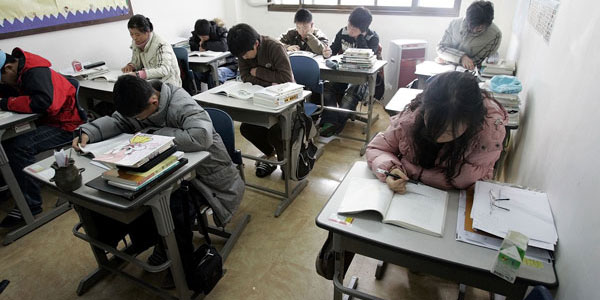
This summer, Sangim Han and Rose Kim reported on Bloomberg Businessweek that South Korea plans to cut Saturday school, something that’s common practice in most Asian countries. Han and Kim pointed out that although President Lee Myung Bak’s intent is to wean South Koreans off of standardized tests and boost consumer activity with free weekends, not having Saturday school will simply mean more time for other tutoring, cram school, and private education. I know what a lot of people are thinking. Those evil Asian Tiger Moms strike again.
It’s been over half a year since Chua’s article in the Wall Street Journal insulted everyone and their mom–literally. This is probably truer for Asian Americans and Asians than any other “group.”
Like most people, I’m so sick of hearing the term Tiger Mom, mainly because I know there are a gazillion simple-minded thinkers out there who are stupid enough to think all Asian or Asian-heritage parents are abusive and cut-throat with their children. I think it’s pretty obvious that no one parenting method can work for all kids, and you know what? For those of you out there who have not had lots of extra-school schooling, I’d like to share with you that it’s not as horrible as you think it is.
Culture of Schooling
First of all, I think people need to back off and consider the fact that Asia as a socio-political geographic region has historically had a more prominent culture of schooling. Take standardized testing for example. China practically invented the standardized test a few thousand years ago, and that system of education has of course influenced many of the countries around it.
Schooling is a cultural practice, and extra schooling for some groups and communities of people is not torture or cut-throat; it’s simply a way of life, as normal as Super Bowl Sundays or Easter Egg hunts.
“Extra” Schooling Not So Bad
Second of all, people tend to picture that extra schooling, tutoring, cram school, or after-school (extra school after regular school is over) as kids chained to a desk being drilled-and-killed like there’s no tomorrow. The reality is, extra-schooling is very varied and can lead to very rich and full-filling experiences.
For example, if I didn’t have that great math tutor in high school, I couldn’t have been a top student in every math class and have the strong math knowledge that continues to enrich my personal and professional life despite not working in a math, science, or engineering field. I was so grateful that my parents provided all the tutors to make up for any subjects that I thought weren’t being taught very well in my regular schooling.
I’ve seen parents who have asked their kids to give up extra-school only have their children burst out in tears because they like going and would miss their friends. I’ve seen kids beg parents to pay for more classes so that they could be with friends.
Kids who go to Chinese school or other after-school programs tend to form strong friendships with students from other schools in the area that they normally wouldn’t interact with. Many of us who grew up going to Chinese school or other after-schools look back on those memories fondly and feel a nostalgia and bond with other students who have gone to that school.
These extra-school experiences can fill in gaps in education, allow more time for developing relationships, broaden children’s social arena, and build enriching communities. There are definitely those experiences that are very ball-and-chain drill-and-kill, but clearly, that’s not always the case nor is it necessarily the norm.
Lesson Learned?
Focusing too much on how much time is spent in school really ignores the more important question of what is being done during time spent at school, whether that includes Saturdays or not.
The educational trend in America has been headed to more and more standardized testing followed by egregious misinterpretations of the data by policy makers, educators, and communities. Snap-shot data meant to describe populations of students is being used to label individual students as if those tests provided detailed case-study information about each student–ask any statistician or research methods specialist and they’ll tell you that’s a big no-no.
Pressure is put on American schools, teachers, parents and students to perform high on these tests which perverts and cripples the whole American system of education into one based on performance on sterilized testing situations instead of real-life learning. Our American education system is becoming more drill-and-kill every day. On the other hand, Asian countries like South Korea are trying to change to go against the drill-and-kill trend whereas America seems to be heading full-throttle towards it.
Pretty soon, we’ll need to coin the term “Eagle Mom” instead. You heard it here first on 8Asians.








